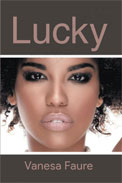
 |
Lucky’s mother is addicted to drugs and makes money by turning tricks in the house while Lucky is home. Lucky rarely eats, and the only kindness she receives is from the family across the street, who are part of a motorcycle gang. When her mother allows Lucky to be repeatedly raped and beaten, the family across the street attempts to adopt Lucky while her mother is sentenced to twelve years behind bars. Then, Lucky’s grandmother finds out she can get a check each month if she takes care of Lucky, so she legally becomes her caregiver. It is then that Lucky finds out her grandmother’s boyfriend is also her father. He didn’t know about Lucky, but once he does, he immediately protects her from her vile grandmother.
Lucky and her friends grow up being able to do just about anything they want, and she has a stash of money from the motorcycle gang family, whom she still contacts. She and her friends start their own motorcycle gang. When out celebrating one night, Lucky kills her mother, who has just recently been released from jail. She and her friends go on the run and end up working as contract killers performing jobs all over the world. However, the girls learn that one of their hits is on the motorcycle gang from Lucky’s past. The girls take the money, warn the gang, and now have a contract out on them.
Comparing Faure’s novel to S. E. Hinton’s young adult classic The Outsiders is easy. Both feature a group of young people who are from the wrong side of the tracks and are basically taking care of themselves. The moral choices made by the two groups seem to be polar opposites, yet both pull the reader in and encourage empathy with these kids. Readers may also be reminded of Spike Lee’s 1989 movie, Do the Right Thing. These works explore the violence and tragedy that can have profound impacts on the lives of inner-city youth. Interestingly, Lee’s film and Faure’s book are much more similar in tone than Hinton’s novel. Hinton’s work is emotionally charged but not nearly as gritty as the text Faure presents. Faure doesn’t pull any punches with what is happening on the street, nor does she shy away from the vernacular of the culture.
Faure’s novel is both dramatic and full of action. It is the coming-of-age story of the protagonist and her friends. Although the prose may come across as jarring and abrasive to some, many readers will find it strikingly authentic. While highly readable, the narrative would have been enhanced by some additional editing. The choices made by many characters will likely be different from what is familiar, but that is part of the draw of reading a book about those who handle situations differently than the reader would likely handle them. Those looking for a hard-hitting but quick book about a young woman coming from terrible circumstances who must find her own way to make good will be thoroughly entertained by Faure’s novel.